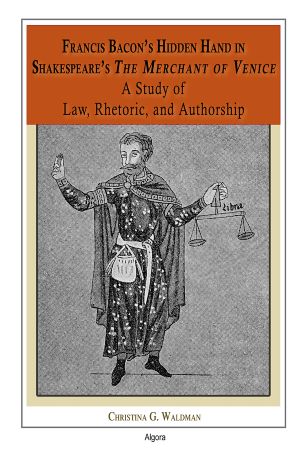by Christina Waldman
September 21, 2020
She was Jewish, but she was not just “for” the Jews. She was a woman, but she was not just “for” women or feminists. She was, like the visionary real Shakespeare who created the inimitable Portia, concerned with the rights and betterment of all.
Portia in The Merchant of Venice was a learned and competent woman jurist in a time when no such thing would have been possible in England–though a woman could have done just what (it appears) Portia did in twelfth century Venice (study law, teach law–in some circumstances, reportedly), and appear in court on behalf of a man who could not appear due to illness; see Christina G.Waldman, Francis Bacon’s Hidden Hand in Shakespeare’s The Merchant of Venice: A Study of Law, Rhetoric, and Authorship, pp. 59, 147).
Granted, Queen Elizabeth was head of the justice system, for she was head of all England, in a time before separation of powers, as we know it today, existed. The world has changed. When the times change, so, too, must the laws. So Justice Ginsberg argued effectively as an advocate in her early cases before the United States Supreme Court.
Like Portia, Justice Ginsberg has been misjudged and misunderstood–even vilified. Portia has been called a “cheater”; Justice Ginsberg, well, I won’t repeat it. Not everyone prefers change to the status quo.
Justice Ginsberg loved the arts. She was a judge in a mock court appeal of Antonio v. Shylock (A. J. Goldman, “In the Case of Shylock v. Antonio, Judge Ginsberg Presides,” Forward (July 30, 2016), https://forward.com/culture/346465/in-the-case-of-shylock-v-antonio-judge-ginsburg-presides/. She loved the opera (see, Chelsea Bailey, “Justice Ruth Bader Ginsberg Wows in Opera Debut,” NBCNews.com, November 14, 2016 (with video), https://www.nbcnews.com/news/us-news/justice-ruth-bader-ginsburg-wows-opera-debut-n683801. In fact, an opera was created out of her friendship with the late United Supreme Court Justice Antonin Scalia (Francesca Zambello, “Ruth Bader Ginsberg Loved Opera, and Opera Loved Her Back,” The New York Times (September 19, 2020), https://www.nbcnews.com/news/us-news/justice-ruth-bader-ginsburg-wows-opera-debut-n683801). The arts can play an important role in giving voice to our humanity and, arguably, in improving our culture and laws (though it seems that should not need to be argued).
I came across a wonderful piece by Molly Conway which has been shared broadly because it is so appropriate to Justice Ginsberg’s passing. Thank you, Ms. Conway, for making it easy to share. Here is the link to: Molly Conway, “May Ruth Bader’s Memory be ‘For a Blessing.'” What, exactly, does that mean?” Forward.com (September 20, 2020), https://forward.com/scribe/454812/may-ruth-bader-ginsburgs-memory-be-for-a-blessing-what-exactly-does-that/.
Justice Ginsberg was Jewish. Historically, the Jewish contribution to jurisprudence, including Anglo-American jurisprudence, has been essential. For just one important aspect of this, see, e.g., Rabbi Sacks, “Devarim (5773): Tzedek: Justice and Compassion,” RabbiSacks.org (July 8, 2013), https://rabbisacks.org/devarim-tzedek-justice-and-compassion/.
Even more than our sorrow, Ruth Bader Ginsberg would want us to carry on her task of fighting injustice. “He hath shewed thee, O man, what is good; and what doth the LORD require of thee, but to do justly, and to love mercy, and to walk humbly with thy God” (Micah 6:8 (KJV). We will miss you, “our” dear RBG!
